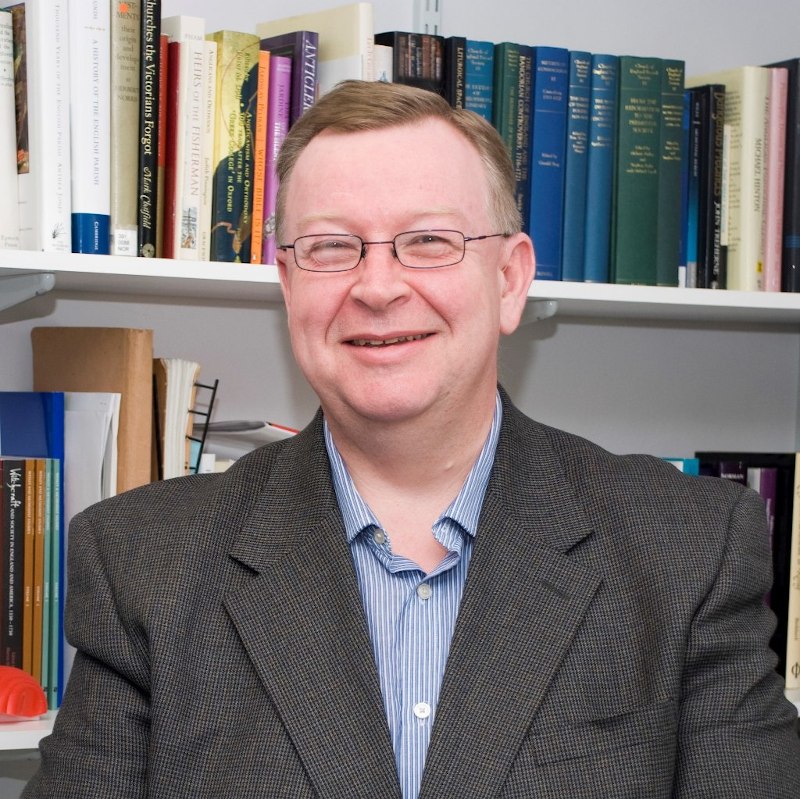Professor William Gibson
BA, MA PhD, DLITT, FSA, FRHISTS, FRSA
Emeritus Professor of Ecclesiastical History
School of Education, Humanities and Languages

Role
I am Director of the Oxford Centre for Methodism and Church History, which is a University research centre focusing on religious history. It also cares for more than a dozen collections of books, artworks and manuscripts.
Area of expertise
- Religious History of early modern and modern Britain (broadly 1600-1900);
- Historical theology;
- History of Universities;
- Welsh history;
- Church and State, the Church and politics.
Teaching and supervision
Supervision
My recent PhD student completions include:
- Chris Metcalfe (2011) ‘Methodist Reunion in Whitby’
- Sally Tye (2013) ‘Religion, the SPCK and the Westminster Workhouses:‘Re-enchanting’ the Eighteenth Century Workhouse’
- Keith Anderson (2014) ‘Images of the Crucifixion in Modern Art’
- John Lenton (2014) ‘John Wesley’s Preachers: The Lives of the Methodist Itinerant Preachers accepted by John Wesley for the Itinerancy’
- Clive Norris (2015) ‘The Financing of Early Methodism’
- Linda Ryan (2015) ‘Child-rearing and Education: The Thinking and Practice of John Wesley and some of his Contemporaries, Evaluated within its Eighteenth-century Context’
- Sarah Prendergast (2016) ‘The Welsh Revival of 1904-05: recovering the role of women’
- Daniel Reed (2018) ‘Patronage, Performance, and Reputation in the eighteenth-century church’
- John Harding (2020) ‘Griffith Jones and the Church of England in Wales in the eighteenth century’
- Steve Sanders (2021) The Upholder in the Age of Chippendale’
Research Students
| Name | Thesis title | Completed |
|---|---|---|
| Thomas Dobson | Training to Teach: Westminster College and the development of Higher Education in the 20th century | Active |
Research
Research projects
I am currently editor of the Journal of Religious History, Literature and Culture and also edit the Routledge Methodist Studies book series.
Groups
Projects as Principal Investigator, or Lead Academic if project is led by another Institution
- Research in Theology of the Methodist Church 2022-23 Academic Year (01/08/2022 - 31/07/2024), funded by: Westminster College Oxford Trust Ltd, funding amount received by Brookes: £682,944
Publications
Professional information
Conferences
Recent papers include:
- 2017 Invited speaker at the Pusey House Anglicanism 1689-1900 seminar.
- 2017 Invited speaker at Nottingham University Conference on the History of Religion and Sexuality.
- 2017 Invited keynote speaker: ‘Spiritual Networks: Religion in Literature and the Arts from 1700’ Martin-Luther-University, Halle-Wittenberg.
- 2017 Invited speaker at the Institute of Historical Research ‘Refashioning History in the Twentieth Century’ on Thomas Frederick Tout.
- 2017 Invited speaker at the University of San Diego Humanities Institute: ‘The Origins of American Rights in a British Crisis in the 1680s’
- 2017 Invited speaker, Point Loma Nazarene University, San Diego.
- 2018 Invited Plenary Speaker Sermons Studies Conference, Montreal.
- 2019 Invited Plenary Speaker Religion and the Enlightenment, Martin-Luther University, Halle-Wittenburg
- 2019 Invited Speaker at the Society of Antiquaries meeting, November.
- 2019 Invited Pleanary Speaker Church and Public Space Conference, Clermont-Avergne University, France.
Consultancy
- 2017-18 Erasmus-funded Visiting Professor, University of Sassari, Sardinia.
- 2019-20 Visiting Professor, University of Clermont-Auvergne, France.
